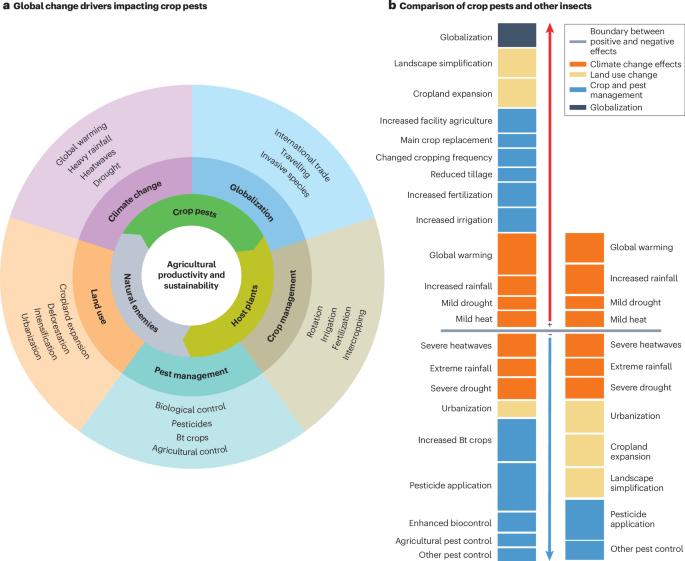Crop pest responses to global changes in climate and land management
引用次数: 0
Abstract
The prevalence of crop insect pests, which damage crops and reduce their yield, is increasing globally owing to changes in climate and land use, posing a threat to food security. In this Review, we synthesize evidence on how tropical, temperate, migratory and soil crop pests respond to changes in climate, land use and agricultural practices. In general, crop pests are responding to warming with expanded geographic ranges, advanced phenological events and increased number of reproductive generations per year. Increased pest damage under warming is projected to exacerbate yield losses of 46%, 19% and 31% under 2 °C warming for wheat, rice and maize, respectively. Pests at mid–high latitudes respond more positively to warming than those in the tropics. Moderate drought can increase pest damage to crops owing to enhanced feeding on plants as a water source and decreased resilience of plants and natural enemies of pests. Increased precipitation reduces small pests through washing them away, but favours pests in general through buffering thermal-hydro stresses. Land use change, such as deforestation and conversion to cropland, enhances warming and reduces biodiversity, leading to enhanced crop damage. Agricultural intensification, particularly fertilization and irrigation, increases the quality and quantity of host plants and buffers pests from environmental extremes, favouring proliferation. Globalization of trade networks increases pest invasions, with associated damage exceeding US $423 billion in 2019. Future research should examine the mechanisms underlying changes in pest status and develop monitoring and prediction systems to inform management approaches. Crop yield losses to insect pests pose a risk to food security. This Review assesses global trends of crop pest prevalence associated with global environmental change, identifies the underlying ecological mechanisms and proposes strategies for effective, sustainable management of pests to support future food security.

作物病虫害对全球气候和土地管理变化的响应
由于气候和土地利用的变化,破坏作物并降低产量的作物害虫在全球范围内日益流行,对粮食安全构成威胁。在这篇综述中,我们综合了热带、温带、迁徙和土壤作物害虫如何响应气候、土地利用和农业实践变化的证据。总的来说,农作物害虫对气候变暖的反应是扩大地理范围、提前物候事件和每年繁殖代数的增加。预计在升温2°C条件下,病虫害危害的增加将使小麦、水稻和玉米的产量损失分别加剧46%、19%和31%。中高纬度地区的害虫对气候变暖的反应比热带地区的更积极。中度干旱可增加病虫害对作物的危害,因为以植物为水源的取食能力增强,而植物和病虫害天敌的抵御能力下降。增加的降水通过冲走小害虫来减少它们,但通过缓冲热-水压力,总体上有利于害虫。土地利用的变化,如砍伐森林和转为耕地,加剧了气候变暖,减少了生物多样性,导致作物受损加剧。农业集约化,特别是施肥和灌溉,提高了寄主植物的质量和数量,并使有害生物免受极端环境的影响,有利于扩散。贸易网络全球化加剧了有害生物入侵,2019年相关损失超过4230亿美元。未来的研究应审查有害生物状况变化的潜在机制,并发展监测和预测系统,为管理方法提供信息。虫害造成的作物产量损失对粮食安全构成威胁。本综述评估了与全球环境变化相关的作物有害生物流行的全球趋势,确定了潜在的生态机制,并提出了有效、可持续的有害生物管理战略,以支持未来的粮食安全。
本文章由计算机程序翻译,如有差异,请以英文原文为准。
求助全文
约1分钟内获得全文
求助全文

 求助内容:
求助内容: 应助结果提醒方式:
应助结果提醒方式:


